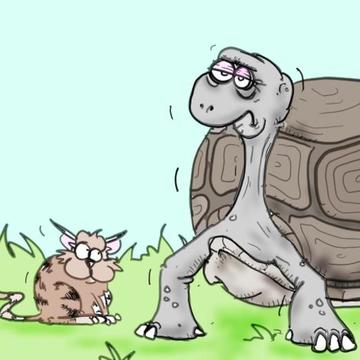The Ageing Game
About the project

Chris Jarvis and Scott Billings at the Museum of Natural History worked with Professor Roberto Salguero-Gomez from the Department of Biology on a project aimed at Key Stage 2 & 3 pupils about ageing and senescence. The project’s activities included a web-based game – the Ageing Game – which asks players to guess which organisms live the longest, as well as associated web content and public events.
The museum worked with Fish in a Bottle to design the Ageing Game. All the other outputs, including cartoons, filming, scripts, and the page on the Museum of Natural History website, were produced in house by the project team.
The game was developed with support by a NERC Independent Research Grant to Professor Salguero-Gomez.
Outputs
Ageing and senescence webpage within the Museum of Natural History’s Learning Zone website, including YouTube videos of Professor Salguero-Gomez discussing:
- What is the difference between ‘lifespan’, ‘aging’ and ‘senescence’?
- Why do scientists study aging, lifespan and senescence in different organisms?
- How do scientists measure the ages of different species?
- Why do different species have such different lengths of lifespan?
- Do bigger things have longer lifespans?
- Do you think people will ever be able to live forever?
Impacts
Professor Salguero-Gomez used the game at the museum’s Christmas lectures and the pupils and teachers engaged in discussing why some things age and some things don’t, what we mean by ageing and guessing how long different organisms live for. One of the Key Stage 3 teachers at the Christmas lectures commented that they would be using it in class as a good gateway resource to use to get children discussing various topics in biology, such as what ageing is in terms of cellular ageing and whole organism ageing, why animals senesce and the evolutionary benefits and drawbacks of ageing or not ageing for a variety of organisms.
Education Officer Chris Jarvis describes the impacts for the Museum of Natural History:
“Although we have lots of resources targeted at various learning outcomes, this was a rare opportunity to have something that seems to allow for much more open-ended discussion in a fun way. We have a whole section of the Learning Zone on ‘Life Processes and Living Things’ (which includes the general processes of respiration, reproduction, movement etc. which are all curricular learning points) but the game allowed us to include something on ageing processes, which is currently a much-debated field where lots of interesting research is taking place.”
Professor Rob Salguero-Gómez added:
“Why we live as long as we do, and under what health conditions, has attracted the attention of researchers going back to the times of Aristotle. To me, what’s puzzling, is that we are in fact not long-lived… compared to other species such as the Greenland shark (which can live over 400 years), or Bristlecone pines (which can live over 5,000 years). Understanding the mechanisms that regulate longevity and ageing is of key importance to understand the biology of any species. Through the collaborative work with the Oxford Museum of Natural History, my research team and I have been able to share the over 5 years of research that we have conducted on precisely these questions. My hope is that this videogame and the associated videos will be of help to students and their teachers to demystify the fact that we are long-lived, and to further attract attention to these key questions by young, talented minds.”
Project team
Professor Roberto Salguero-Gomez, Department of Biology
Chris Jarvis, Museum of Natural History
Scott Billings, Museum of Natural History




